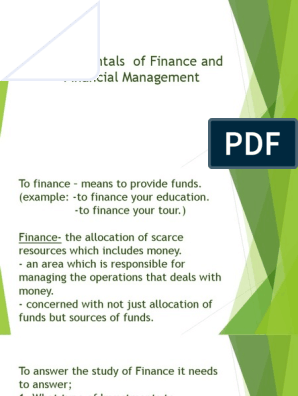0% found this document useful (0 votes)
18 views10 pagesFinance Lecture
The document provides a comprehensive overview of finance, including its definition, history, importance, and various categories such as public, corporate, and personal finance. It distinguishes finance from economics and accounting, outlines the functions of a finance manager, and explores potential career paths in the finance sector. Additionally, it includes examples of key finance terms to enhance understanding.
Uploaded by
samuel ojogboCopyright
© © All Rights Reserved
We take content rights seriously. If you suspect this is your content, claim it here.
Available Formats
Download as PPTX, PDF, TXT or read online on Scribd
0% found this document useful (0 votes)
18 views10 pagesFinance Lecture
The document provides a comprehensive overview of finance, including its definition, history, importance, and various categories such as public, corporate, and personal finance. It distinguishes finance from economics and accounting, outlines the functions of a finance manager, and explores potential career paths in the finance sector. Additionally, it includes examples of key finance terms to enhance understanding.
Uploaded by
samuel ojogboCopyright
© © All Rights Reserved
We take content rights seriously. If you suspect this is your content, claim it here.
Available Formats
Download as PPTX, PDF, TXT or read online on Scribd
/ 10





















































































